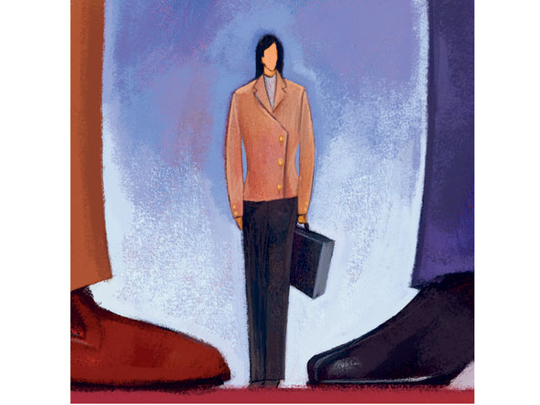
Every time I read about women and business, the words of Nobel Peace Prize winner Mohammad Younus ring in my ears.
When I met Younus, the pioneer of microcredit and founder of Grameen Bank, in Amman many years ago, we were part of a group of officials and journalists visiting some small businesses run by Jordanian women. On the way, I asked about his preference for providing women more than men with loans to start businesses.
"Women usually spend almost all their income on their families, unlike men," he replied, adding that men usually spend part of the income on entertainment. "After receiving his cheque, he might go to a bar."
Recently, the conversation came to my mind when I read an article in the Economist entitled We did it, with the image of Rosie The Riverter the iconic American figure of a woman, wearing a scarf on her head while flexing the muscles of her right hand with the slogan ‘We can do it'. The image, which goes back to the 1940s, was aimed at encouraging women to work in industry during the Second World War when thousands of men were sent to Europe and the Pacific.
Today, the increasing numbers of educated and working women coincide with a growing call to pay more attention to women's economic power.
Women should be allowed to play a more active role in the workforces in their countries. Such participation is healthy for women, societies and economies as well.
Empowerment
For instance, in a few months, the Economist predicts American women will "cross the 50 per cent threshold and become the majority of the American force".
According to the article, "Women's economic empowerment is arguably the biggest social change of our times."
However, the change of women's roles worldwide is still developing, and has not taken its final shape. There are still problems and challenges ahead.
While millions of women are being given the chance to utilise their skills and actually reach the top, many tens of millions are still facing myriads of hurdles on the way to the top.
Giant corporations are run by women in the world, and in different fields far away from those "traditionally and culturally" related to women, such as cosmetics.
Women sit at the helms of big western companies like Pepsico (food and beverages), Areva (nuclear energy), Anglo-American (mining), DuPont (chemicals), Sunoco (oil) and Xerox (technology), Yahoo (internet).
Female bosses of such companies can be looked at as examples of what the situation would be if women were given the chance to prove themselves.
In general, women are hardworking, serious and capable workers if they are given the opportunity to prove themselves.
They filled six out of eight million jobs created in the European Union in the past 10 years, and some reports claim three out of four people thrown out of work in the US since the crisis are men.
Some might ask, "Why give women preference over men in difficult times, including the current international financial crisis?"
Equality
There are several parts to that answer.
First, women should not be given preference. They should be treated equally at all times.
Second, women want a chance to prove their seriousness, abilities and capability. They can be winners.
Third, women are family-oriented. They do care about their families' needs. They express passion and show strong commitment to their work.
Fourth, women can be better ‘lateral thinkers', and ‘more idealistic' in the bargain.
"The recent financial crisis proved that the sorts of qualities that men pride themselves on, such as risk-taking and bare-knuckle competition, can lead to disaster.
"Lehman Brothers would never have happened it had been Lehman Sisters," the Economist said, summarising a theory of how valuable women in business can be.
Fifth, there is a wide belief that no one understands women's problems better than women themselves. Therefore, the presence of women in decision-making positions could lead to solutions to other compatriots' problems, particularly those related to working mothers and child care.
Sixth, national economies need to utilise the females' ‘brains', which they have invested in for many years through school and university. Good investments in good mothers can build better families in the future, but the country's economy must also enjoy the benefits of its development.
Participation
Increasing women's participation in the labour market to male levels will boost gross domestic product by 21 per cent in Italy, 19 per cent in Spain, 16 per cent in Japan, 9 per cent in American, France and Germany, and 8 per cent in Britain, according to some researchers.
Women are starting to outnumber men in schools and universities in many parts of the world. It is expected that there will be 2.6 million more female than male university students in America by 2011.
In some Arab countries, including the UAE and Qatar, women already outnumber men, according to researchers and analysts. Arab countries in general need to focus on eradicating high illiteracy among females, estimated at nearly two-thirds of the nearly 60 million illiterates.
As the wheels of globalisation keep turning, social barriers facing females are gradually disappearing and discrimination will start fading.
The demands of a free economy are expected to set the rules, and women are prepared to keep their silent revolution going.












